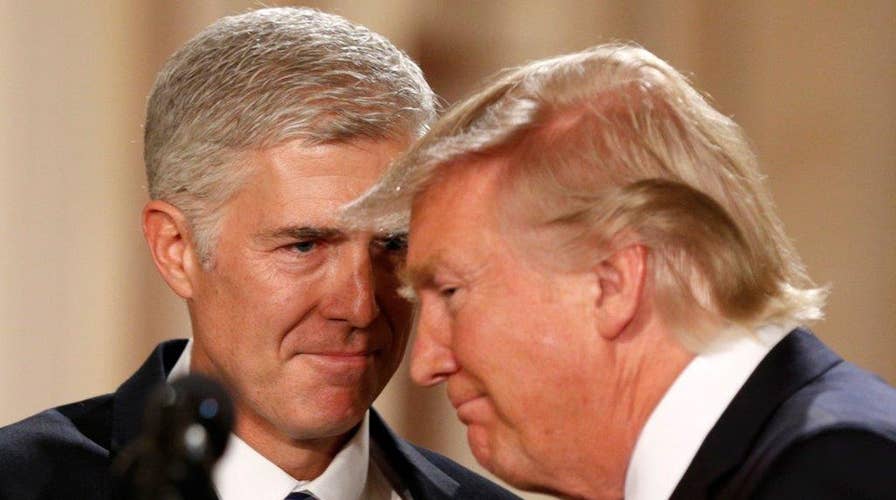Demonstrator: Gorsuch is too friendly with Wall Street
Some groups immediately opposing the president's Supreme Court nominee, Neil Gorsuch. Tucker talks to one demonstration leader who explained why #Tucker
Senate Minority Leader Chuck Schumer and his Democratic colleagues wasted no time Tuesday night voicing “serious doubts” about President Trump’s Supreme Court nominee, signaling a tough battle ahead for Judge Neil Gorsuch as the New York senator insisted he garner 60 votes for confirmation.
“The Senate must insist upon 60 votes for any Supreme Court nominee,” Schumer said. “Make no mistake, Senate Democrats will not simply allow but require an exhaustive, robust and comprehensive debate on Judge Gorsuch's fitness to be a Supreme Court justice.”
The statement raises the specter of a filibuster, though it’s not yet clear whether Schumer or any of his fellow Democrats would take the procedural step to force Gorsuch to clear the 60-vote hurdle.
If they do, Gorsuch would need at least eight Democrats to join Republicans in supporting him, unless GOP leaders take the potentially risky step of lowering the threshold for confirmation.
Republicans have 52 senators and Democrats have 48. If confirmed to the court, Gorsuch would restore the 5-4 conservative tilt that existed before Justice Antonin Scalia’s death in early 2016. The court has been split along ideological lines for nearly a year.
But after Republicans refused to consider then-President Barack Obama’s nominee, some Democrats are already vowing to oppose Gorsuch.
Sen. Elizabeth Warren, D-Mass., said in a statement that Trump “failed” to pick a “consensus nominee.”
“Based on the long and well-established record of Judge Gorsuch, I will oppose his nomination," she said.
The call by Schumer -- the top Democrat in the Republican-controlled Senate that will vote on Gorsuch’s nomination -- to insist on a 60-vote bar extends the rising backlash to what Trump critics consider his extreme policies, namely last week’s executive order on refugee and immigration policies.
“A little more than a week into the Trump presidency, the new administration has violated our core values, challenged the separation of powers and tested the very fabric of our Constitution in unprecedented fashion,” Schumer said. “It is clear that the Supreme Court will be tried in ways that few courts have been tested since the earliest days of the Republic.”
Gorsuch, an appeals judge in the Denver-based 10th Circuit, would fill the seat left open by Scalia’s death.
“The qualifications of Judge Gorsuch are beyond dispute,” Trump said in announcing his nominee.
The high-stakes Washington fight over a Trump pick began well before the Republican president announced Gorsuch.
The conservative group Judicial Crisis Network said Tuesday night that it has already started a $10 million, multi-media ad campaign in support of Gorsuch.
Meanwhile, several progressive groups, including People for the American Way, in the days and weeks ahead of Trump’s announcement touted campaigns to oppose any of his nominations.
“The burden is on Judge Neil Gorsuch to prove himself to be within the legal mainstream,” Schumer also said. “Given his record, I have very serious doubts about Judge Gorsuch's ability to meet this standard.”
Oregon Democratic Sen. Ron Wyden, who has already been critical of Trump’s Cabinet nominees, said the Gorsuch nomination “represents a breathtaking retreat from the notion that Americans have a fundamental right to constitutional liberties and harkens back to the days when politicians restricted a people’s rights on a whim.”
He argued in part that Gorsuch’s opposition to so-called “right to die” or “death with dignity” laws suggests that his Supreme Court decisions will further erode Americans’ individual rights.
Senate Majority Leader Mitch McConnell, though, joined numerous other GOP senators in hailing the president’s choice -- as he called on Democrats to treat him fairly.
“He has an impressive background and a long record of faithfully applying the law and the Constitution,” said McConnell, R-Ky. “I hope members of the Senate will … show him fair consideration … with an up-or-down vote on his nomination, just like the Senate treated the four first-term nominees of Presidents Clinton and Obama.”





